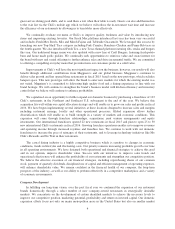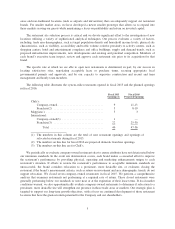Chili's 2015 Annual Report Download - page 20
Download and view the complete annual report
Please find page 20 of the 2015 Chili's annual report below. You can navigate through the pages in the report by either clicking on the pages listed below, or by using the keyword search tool below to find specific information within the annual report.immediately publish the content their subscribers and participants can post, often without filters or checks on
accuracy of the content posted. Information posted on such platforms at any time may be adverse to our interests
or may be inaccurate, each of which may harm our performance, prospects, or business. The harm may be
immediate without affording us an opportunity for redress or correction. The dissemination of information online
could harm our business, prospects, financial condition, and results of operations, regardless of the information’s
accuracy.
Many of our competitors are expanding their use of social media and new social medial platforms are
rapidly being developed, potentially making more traditional social media platforms obsolete. As a result, we
need to continuously innovate and develop our social media strategies in order to maintain broad appeal with
guests and brand relevance. As part of our marketing efforts, we rely on search engine marketing and social
media platforms to attract and retain guests. We have initiated a multi-year effort to implement new technology
platforms that will allow us to digitally engage with our guests and employees and strengthen our marketing and
analytics capabilities in this increasingly connected society. The initiatives may not be successful, resulting in
expenses incurred without the benefit of higher revenues, increased employee engagement or brand recognition.
In addition, a variety of risks are associated with the use of social media, including the improper disclosure of
proprietary information, negative comments about us, exposure of personally identifiable information, fraud, or
out-of-date information. The inappropriate use of social media vehicles by our guests or employees could
increase our costs, lead to litigation or result in negative publicity that could damage our reputation.
Litigation could have a material adverse impact on our business and our financial performance.
We are subject to lawsuits, administrative proceedings and claims that arise in the regular course of
business. These matters typically involve claims by guests, team members and others regarding issues such as
food borne illness, food safety, premises liability, compliance with wage and hour requirements, work-related
injuries, discrimination, harassment, disability and other operational issues common to the foodservice industry,
as well as contract disputes and intellectual property infringement matters. We could be adversely affected by
negative publicity and litigation costs resulting from these claims, regardless of their validity. Significant legal
fees and costs in complex class action litigation or an adverse judgment or settlement that is not insured or is in
excess of insurance coverage could have a material adverse effect on our financial position and results of
operations.
We are dependent on information technology and any material failure in the operation or security of that
technology or our ability to execute a comprehensive business continuity plan could impair our ability to
efficiently operate our business.
We rely on information systems across our operations, including, for example, point-of-sale processing in
our restaurants, management of our supply chain, collection of cash, payment of obligations and various other
processes and procedures. Our ability to efficiently manage our business depends significantly on the reliability
and capacity of these systems. The failure of these systems to operate effectively, problems with maintenance,
upgrading or transitioning to replacement systems, or a breach in security of these systems could cause delays in
customer service and reduce efficiency in our operations. A security breach or cyber attack could include theft of
credit card data or other personal information as well as our intellectual property. Significant capital investments
might be required to remediate any problems.
Additionally, our corporate systems and processes and corporate support for our restaurant operations are
handled primarily at our restaurant support center. We have disaster recovery procedures and business continuity
plans in place to address most events of a crisis nature, including tornadoes and other natural disasters, and back
up and off-site locations for recovery of electronic and other forms of data and information. However, if we are
unable to fully implement our disaster recovery plans, we may experience delays in recovery of data, inability to
perform vital corporate functions, tardiness in required reporting and compliance, failures to adequately support
14
























